
Author
Katharina Krug
CEO & Founder
DE
EN
DE
EN

Author
CEO & Founder
ERP & CRM form the basis of a digitalised company. In this article, you will learn what is behind these terms, which factors need to be taken into account when introducing them, and how they can help your company move forward.
Enterprise Resource Planning (ERP) and Customer Relationship Management (CRM) systems help companies manage and optimise their processes.
ERP software helps organise processes and integrate them into a single system. Meanwhile, the application possibilities are manifold - sales, purchasing, production, human resources and inventory management are just some of the numerous functional areas of an ERP system.
On the other hand, CRM software focuses primarily on sales, marketing and customer service. Here, the software tracks and analyses important customer information so that companies can reach their customers in an effective way.
I would like to refer you to our comprehensive guide on CRM and Marketing Automation.
Whether you should rely on ERP or CRM depends on several individual factors and should be thoroughly thought through before making a decision. Costs and the required effort also play an important role in the decision-making process. The following applies to both systems: a company introduction requires time, intensive training and ongoing adjustments. However, once these hurdles have been overcome, your company will benefit from numerous advantages.
Before implementing any system, a proper ERP and/or CRM strategy is necessary to maximize the software's potential.
The greatest possible benefit is achieved by combining both systems. Both tools complement each other, ensuring seamless information flow and transparent workflows. The result is improved customer relations, more efficient work processes, increased sales opportunities at lower costs and optimised collaboration between different departments.
Whether you choose CRM, ERP or a combination of both, your business will surely benefit in the long run. Implementing such a system is an important milestone in the digitalisation of your company and a big step forward.
Before we dive deeper into the topic and look at the differences, similarities and advantages of integrating ERP & CRM, we need to understand a few essential basics. Let's start with the definition of both terms.
ERP (Enterprise Resource Planning) systems are software solutions that help companies to control, manage and optimise business processes. They are based on a central database and integrate various business areas such as procurement, sales, warehouse management or accounting. This means that important areas and processes can be managed centrally throughout the entire company.
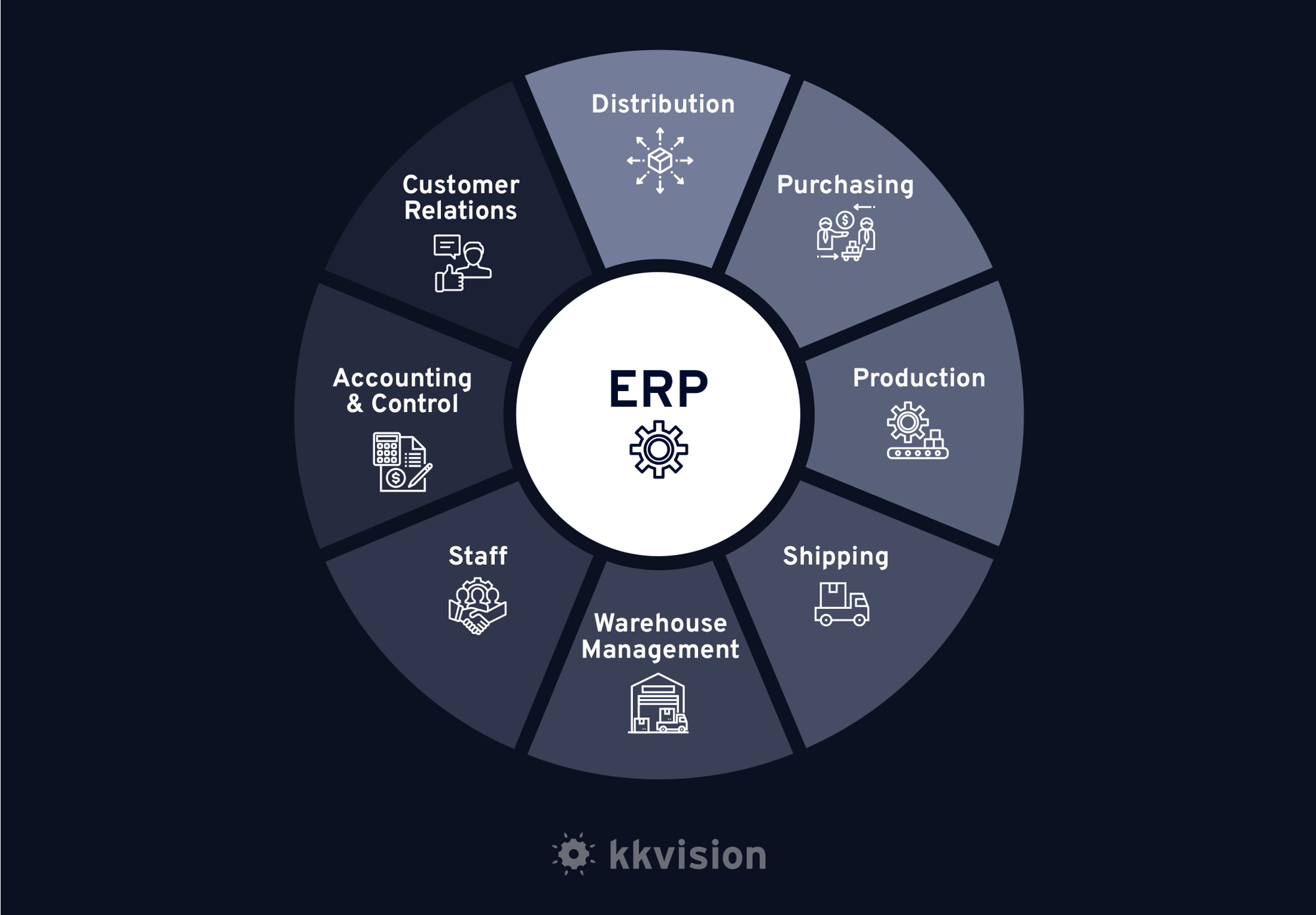
CRM (Customer Relationship Management) systems digitally map the complete sales and marketing structure of a company. From initial contact and sales to contract management, customer care and support. They make it possible to store important information such as contact data, call notes and purchase information in a centralised way and to process it across departments. Therefore, they form the basis for centralisation, measurability and optimisation of sales processes as well as for sales automation.
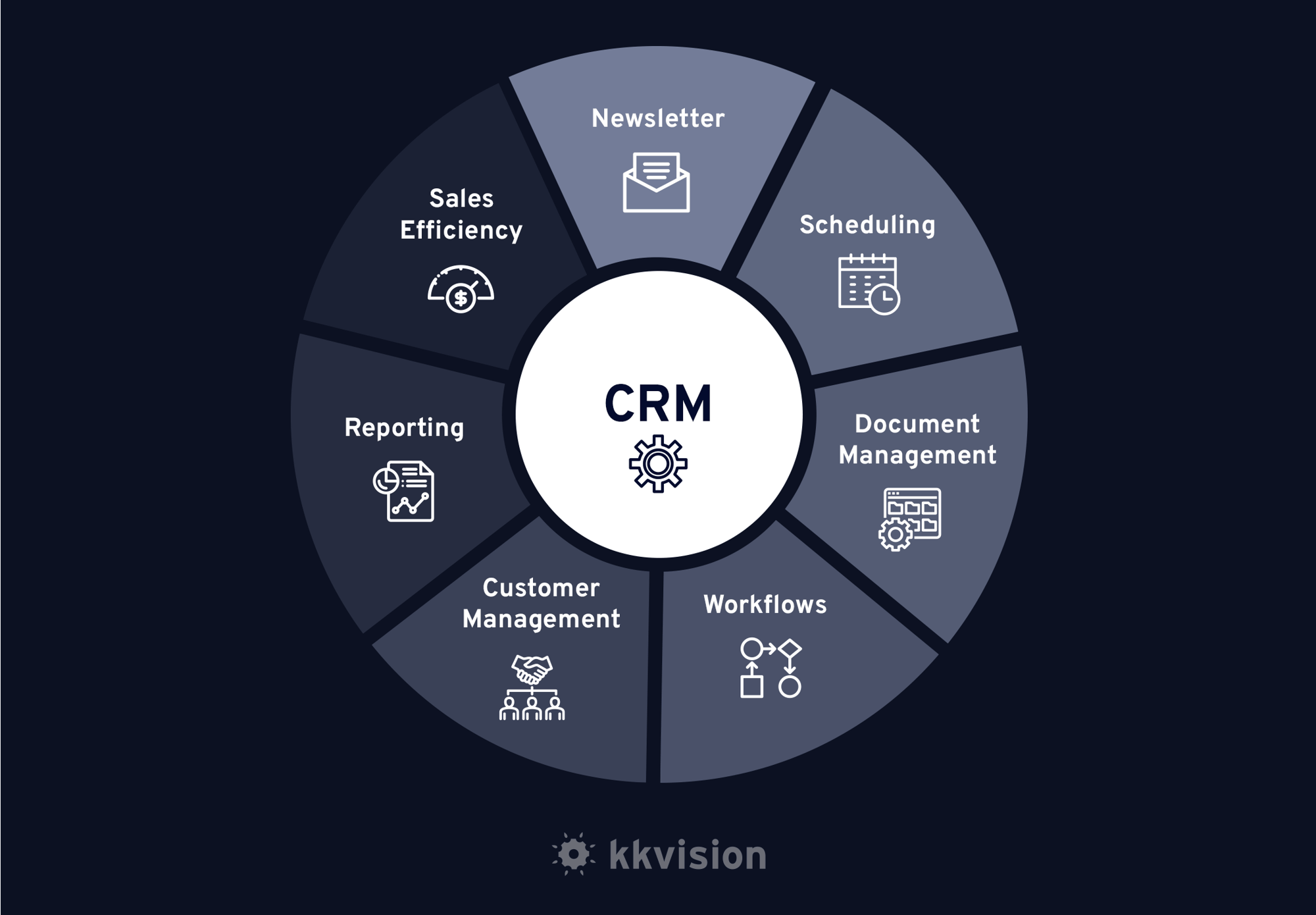
ERP software systems are designed to integrate all facets of a company. ERP can be adapted to the needs of a company and is primarily used to control, manage and optimise internal business processes.
The possible applications are manifold. Among other things, ERP is used to manage, control and analyse:
ERP tools can be complex or simple, depending on the requirements. As you can see in the list, sub-areas of CRM can also be covered. But we will talk about this later.
A properly implemented system promotes communication and collaboration between individual departments and makes it easier to work towards common goals. This, in turn, can help identify the needs and goals of your customers. Data can be shared, and opportunities for cross-functional collaboration can be identified. As a result, your company can optimise its processes and boost productivity.
Jim Hagemann Snabe (Former SAP CEO)
CRM is a software system that stores and analyses customer data. It helps companies to identify their customers' needs and goals and track all interactions with them in the company.
Customer Relationship Management (CRM) is limited to sales, marketing, and customer management, unlike ERP. However, a CRM can handle a company's complete sales process.
The classic functions include:
CRM software enables you to better understand your customers by analysing customer interactions with your business. Moreover, you can create personalised marketing campaigns based on customer preferences or previous purchases - this applies to both B2C and B2B marketing automation campaigns.
In particular, the collaboration between sales and marketing is optimized, resulting in increased sales and reduced costs.
Bobby Darnell (Founder of Construction Market Consultants, Inc.)
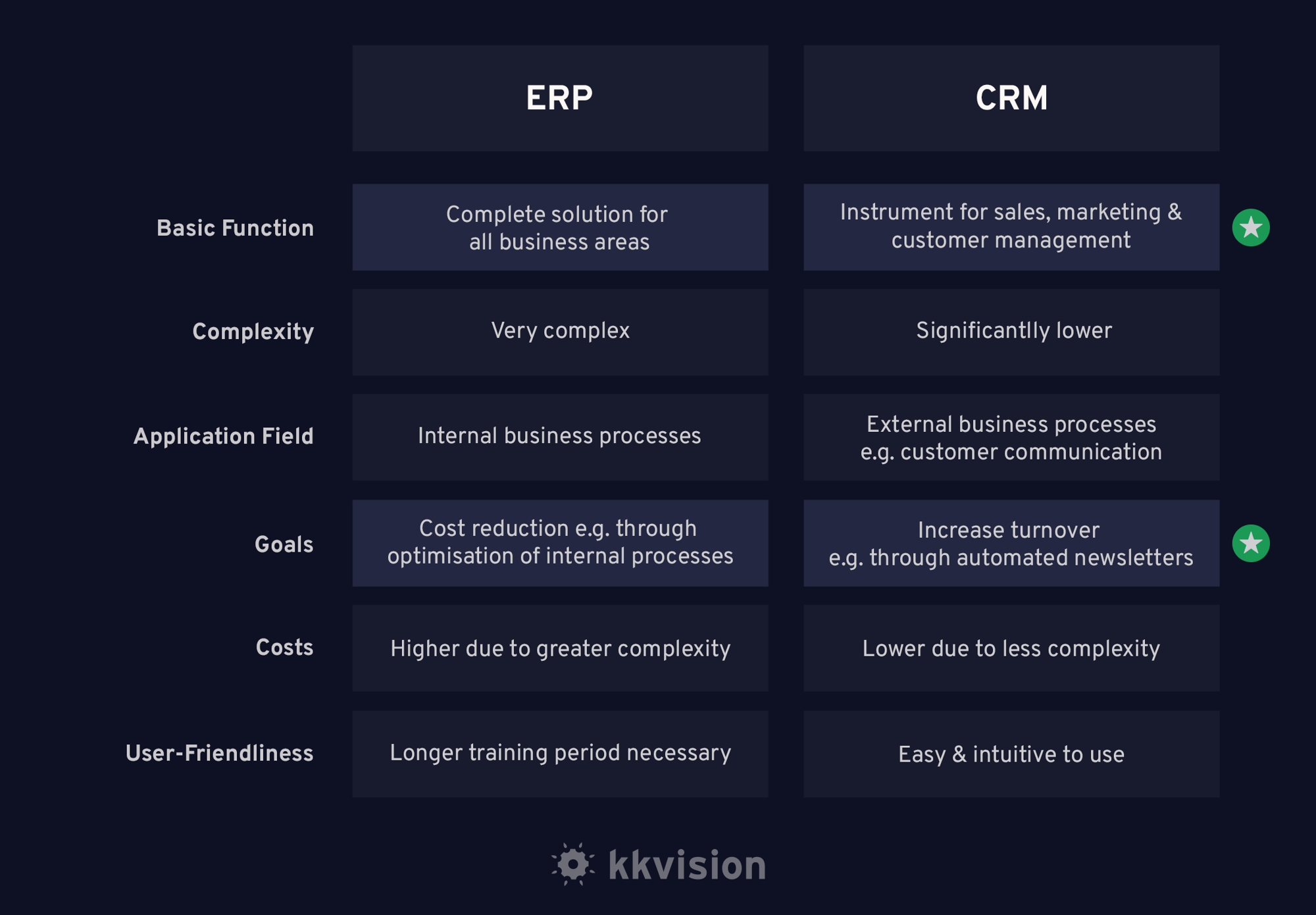
The most important difference between ERP and CRM lies in their respective basic functions. While CRM is an instrument for the areas of sales, marketing and customer management, ERP is a complete solution that covers and unites almost all company areas.
If we consider the different basic meanings of the two systems, the next difference quickly becomes apparent. ERP systems are geared to the entire company and are, therefore, much more complex in their range of functions. CRM, on the other hand, is limited to individual areas and can sometimes even be considered part of ERP.
Another difference between ERP and CRM is the respective area of application. While the former is geared towards internal business processes, the latter is used to optimise external business processes such as customer communication.
In terms of objectives, both tools often overlap or complement each other. Nevertheless, there is also a serious difference in this point. ERP software primarily serves the goal of cost reduction. This is to be achieved by optimising internal business processes. CRM, on the other hand, is mainly intended to increase turnover. For example, through automated newsletters (e.g. with the help of Pardot).
Comparing the costs of CRM and ERP directly is challenging due to numerous factors. One thing is certain: There are enormous price ranges in both areas. From free solutions to several hundred thousand euros. Depending on the provider, the size of the company, the range of functions and the set-up costs.
The current CRM systems are usually much more user-friendly than ERP systems. They can be used easily and intuitively after a short training period. ERP tools, on the other hand, are usually much more extensive and programmed more for functionality than for user-friendliness. This usually requires a longer training period.
The question of whether you need both CRM and ERP, or only one of the two, is not easy to answer. The answer depends on your company and your individual business situation. On what goal you ultimately want to achieve.
As a specialised CRM agency with plenty of ERP expertise, we are happy to support you in finding the perfect solution to match your goals.
If your focus is to improve your customer service and increase sales through optimised sales processes, then a CRM will be the appropriate choice. However, if you want to make your internal business processes more efficient and manage them, then an ERP system will be the tool to go with.
Investing in one of the two systems makes particular sense if your company is on a growth path. The following is a small example to illustrate this.
For very many companies, Excel spreadsheets are the tool of choice to record customer data, business information and sales. This way is absolutely legitimate, but with increasing problems as it grows.
For example, over time it becomes more and more difficult to store and maintain information in just one place. The more complex a single table becomes, the more error-prone it will be. Typically, there are also several tables that are used by different employees and teams. This not only creates redundancy but also makes communication and the overview more difficult.
With the help of an ERP or CRM, however, you can store information centrally in one place. Processes and data can be edited and maintained across departments. Notes can be easily retrieved. Collaboration is strengthened, customer service is optimised and work processes become more efficient.
The cost of ERP and CRM varies depending on the needs of your business and the features you want. If you have a small business with only a few employees, the cost is usually less than if you have a large business with hundreds or thousands of employees.
For smaller businesses, there are affordable options (with limited functionality) that don't require too much customisation or training. However, if your company has many employees and processes, it may be worth paying for more advanced solutions.
CRM systems are complex and multi-layered. Advantage - They can be adapted to individual needs and budgets.
The price depends on several factors:
The price ranges are very wide, and it is, therefore, difficult to make a general statement. Simple CRM solutions are available as a rental model from low double-digit euro amounts per user per month, while more complex solutions can cost up to €100 and more per user per month.
The following is an actual breakdown of expenses from HubSpot, the service provider.
The HubSpot Marketing Hub Professional tariff currently costs €740 per month. The price is not based on the number of users but on the number of marketing contacts (as of February 2023).
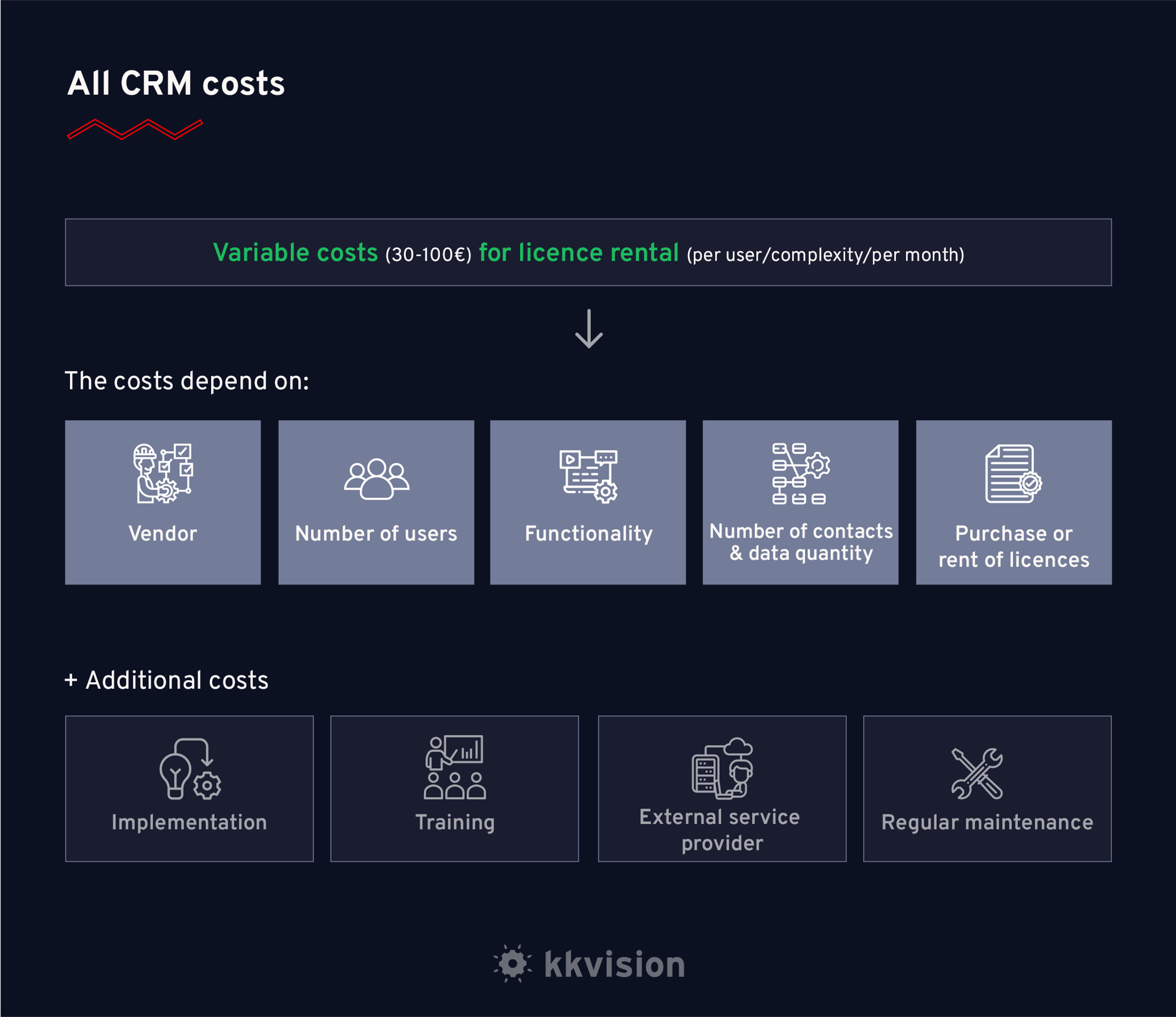
The costs for an ERP system can also vary. Depending on the size of the company, the license costs between 50 and 100 € per user per month (rental version).
The cost level is also dependent on several factors:
The following is an actual breakdown of expenses from SAP, the service provider.
The SAP Professional User Cloud licence is currently available for €91 per month per user (as of February 2023).
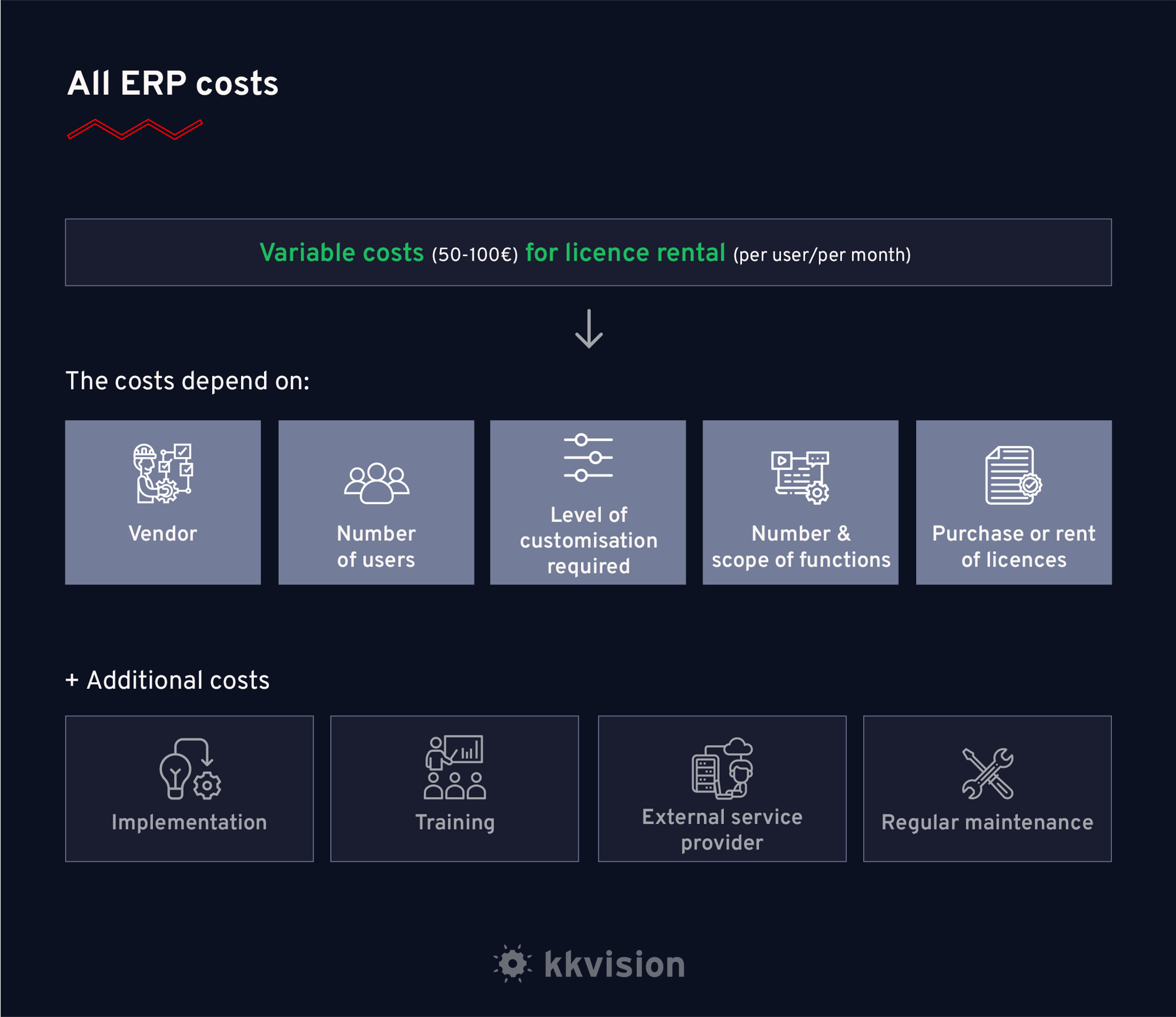
The same applies to both systems - one of the most important factors in pricing is whether you want to buy or rent the software licences. Depending on your needs, the latter is usually the more cost-effective option. The number of users is also decisive in the question of price.
Moreover, there are costs for implementation, training and, if necessary, external service providers. Regular maintenance and servicing of the systems should also be considered when planning the budget.
It is true that implementing a CRM and/or ERP system can come at a high cost. In the long run, however, investment costs are recovered through improved business processes, increased revenue, and reduced costs.
The effort required to implement a new ERP or CRM system must also be taken into account. Projects in both disciplines can basically be divided into four phases:
We offer free online consultations to help find the best solution for your company.
A CRM system helps you improve customer service, sales and marketing processes. The right information is provided at the appropriate time, which significantly increases your turnover.
ERP systems, on the other hand, help to optimise internal business processes and to manage and design operations more efficiently. They therefore relieve the burden on company management and save costs in the long term.
You see - both tools benefit your company. If you want to improve customer service and optimise your internal business processes at the same time, the integration of ERP and CRM will offer some considerable advantages.
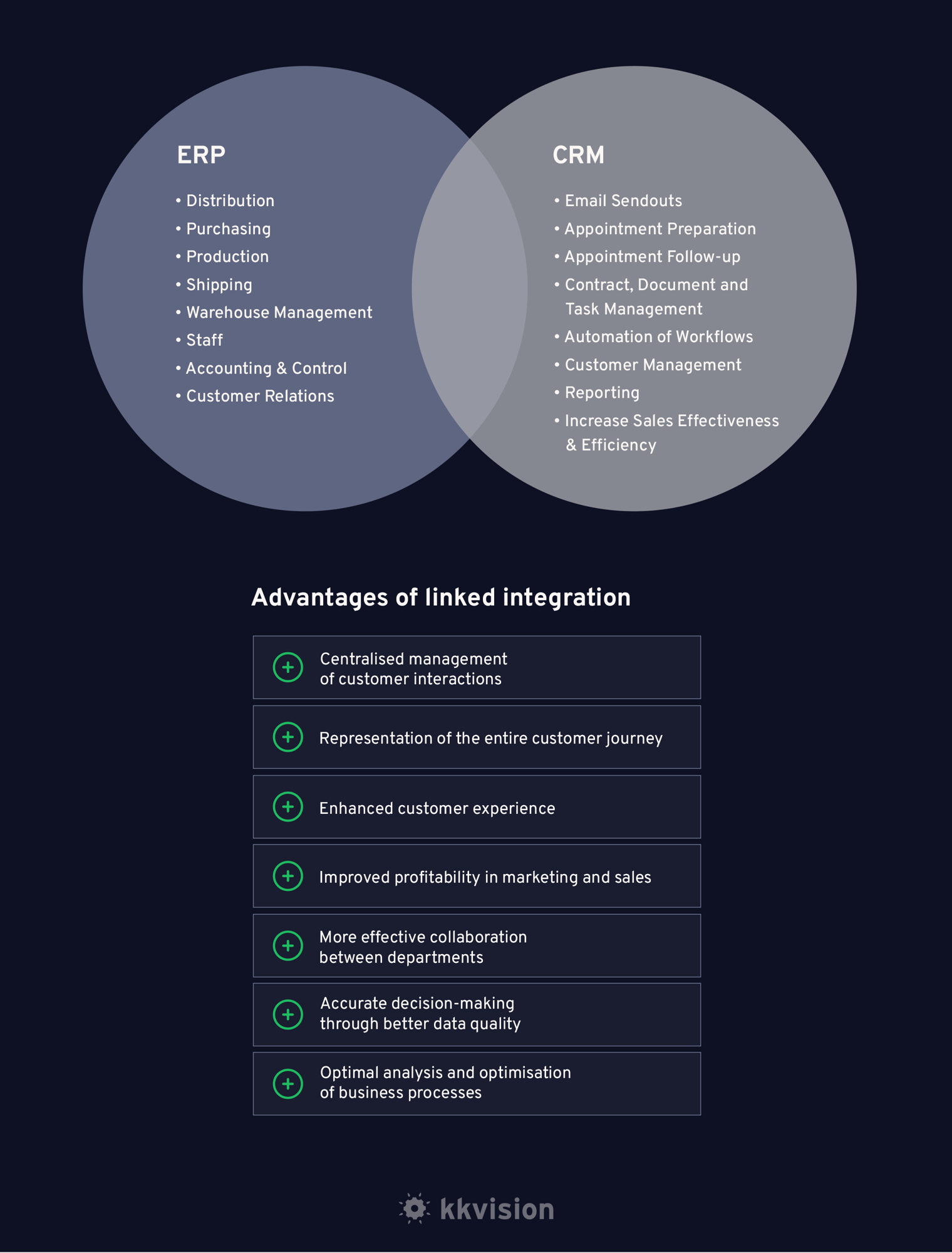
You get the greatest possible benefit for your company if you link the two systems. Besides the automated communication of the systems (saves time, reduces errors and keeps data up to date), the integration brings the following advantages:
A combination of the two tools offers you maximum added value. So, if you have the opportunity and the use of both tools makes sense for your company, you should definitely aim for a linked solution.
Both ERP and CRM systems are powerful tools in their own right. Which of these two tools makes sense for your company depends on your individual requirements. To get the most benefit, it's best to use both tools together.
The interaction of both platforms makes it possible to design business processes more efficiently and successfully. By linking them, you can better control, plan and optimise business processes.
In addition, communication and cooperation within the company is improved. This leads to higher productivity and better decisions. Customer loyalty is also strengthened by linking ERP and CRM, as the data from both systems can be used to create individual offers and solutions.
So, all in all, the integration of ERP and CRM offers a multitude of benefits. If you need support with the implementation, please feel free to contact us. We have many years of experience and are here to provide advice and practical help.
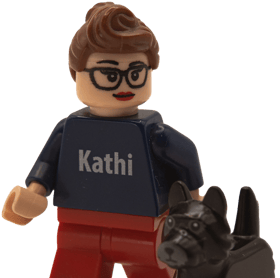
About the author
A suitable strategy is needed for CRM to succeed. It is necessary to ensure that customer relationships are successfully managed and lived in the company.
Modern companies can hardly do without CRM and Marketing Automation. But where do the boundaries actually lie, and where do they blur? How can both systems be combined and the optimum results be...
Recently, kkvision implemented a comprehensive digitization project with the catering company Last Exit, from which the company benefited greatly right from the start. Find out here how a catering...